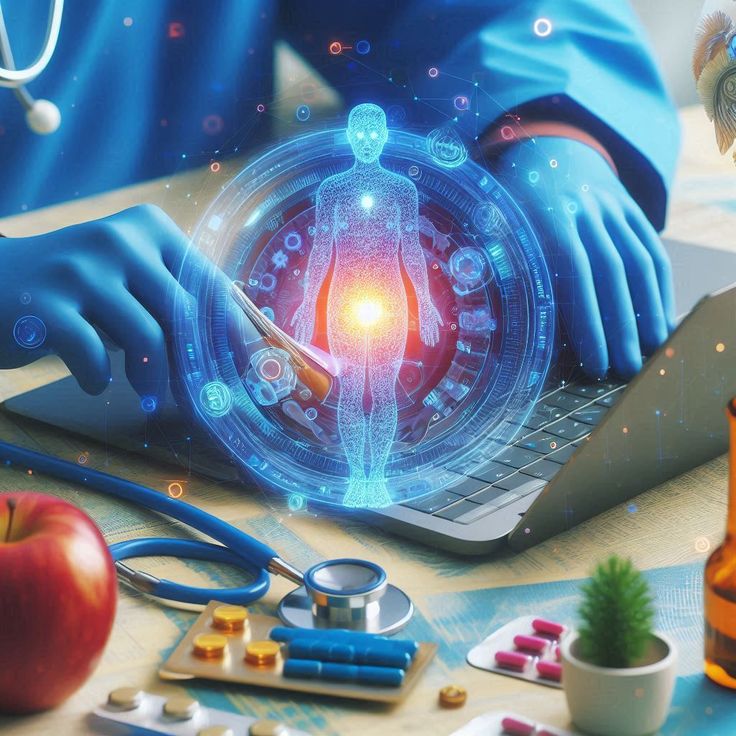10 Medical Advancements to Keep an Eye on in 2025
The future of medicine and patient care is being shaped by ground-breaking technologies in the rapidly changing healthcare sector. These ten medical advancements are poised to transform diagnosis, care, and general health as we approach 2025.
1. AI-Assisted Diagnostics

Medical diagnostics are being improved by artificial intelligence (AI), which also speeds up turnaround times and increases accuracy. More accurately and earlier than ever before, doctors are using AI-driven technologies to identify ailments like cancer, Alzheimer’s, and heart issues. In order to facilitate faster and more precise diagnosis, machine learning algorithms are also being utilized to evaluate intricate medical imaging and pathology data.
2. Personalized Treatment

Personalized medicine is being driven by advances in biotechnology and genomics, which enable therapies that are specific to a patient’s genetic composition. This method reduces adverse effects and increases treatment efficacy, especially in uncommon disorders and cancer. Medical practitioners can use next-generation sequencing to forecast patient responses to medicines and modify treatments accordingly.
3. Health Technology Wearable

Real-time health monitoring is being made possible by wearables like smartwatches and biosensors, which check vital indications like blood sugar, oxygen saturation, and heart rate. By 2025, these gadgets will provide even more sophisticated analytics, supporting the management of chronic conditions and early illness identification. Preventive care and patient involvement will be further improved by developments in bioelectronic wearables and AI-powered health analytics.
4. Growth of Telemedicine

Medical consultations are now more accessible thanks to the expansion of virtual healthcare services. Telemedicine is anticipated to deliver seamless patient care, lowering hospital visits and improving preventative medicine with the use of enhanced AI chatbots, remote monitoring, and telehealth platforms. Enhancing patient interactions and medical education is another benefit of incorporating virtual reality (VR) and augmented reality (AR) into telehealth.
5. mRNA Treatments Other Than COVID-19
New therapies have been made possible by the development of mRNA vaccines. Researchers are looking into mRNA-based treatments for genetic abnormalities, autoimmune illnesses, and cancer, which might usher in a new age of effective and focused treatments. Protein replacement treatments and customized cancer vaccinations are two other applications of mRNA technology advancements that are creating new avenues for disease management.
6. Editing Genes using CRISPR
Rapid advancements in CRISPR technology might lead to treatments for hereditary diseases including cystic fibrosis and sickle cell anemia. By 2025, novel gene-editing uses will advance precision medicine and enable the treatment of illnesses that were previously incurable. Researchers are also looking at how CRISPR may be used to treat age-related illnesses and viral infections.
7. Using AI to Find New Drugs
Because AI-driven systems can predict compound interactions and find possible therapies more quickly, they are speeding up drug research. Patients with chronic and uncommon diseases may benefit from this invention as it might drastically reduce the time needed to bring new medications to market. AI-powered drug repurposing is also enhancing therapy choices by assisting in the discovery of novel applications for already-approved drugs.
8. 3D Organ Bioprinting
By utilizing a patient’s own cells to create tissues and potentially whole organs, 3D bioprinting is transforming organ transplantation. By 2025, this technique may lead to advances in regenerative medicine, which would lower the risk of rejection and organ transplant waitlists. To aid in organ regeneration and repair, researchers are concentrating on printing functioning tissues, such as patches for the liver, kidney, and heart.
9. Surgical Robotics
The accuracy of minimally invasive robotic-assisted procedures is increasing, which shortens recovery periods and enhances results. Complex treatments will be improved by new robotic technologies, especially in orthopedics and neurosurgery. Accuracy and patient safety will be increased by next-generation surgical robots with AI, haptic feedback, and superior imaging.
10. DTx, or digital therapeutics
Software-based therapies and digital health apps are becoming more popular as recommended treatments for diabetes, chronic pain, and mental health issues. By 2025, DTx will still be growing and providing people with non-pharmaceutical options for treating their ailments. These tools make healthcare more proactive and patient-focused by using AI and behavioral data to deliver tailored therapies.
In conclusion
These developments are revolutionizing healthcare by improving the effectiveness, accessibility, and personalization of therapies. These developments will have a significant impact on how medicine develops in 2025 and beyond as technology keeps developing. From AI-powered diagnostics to groundbreaking gene-editing therapies, the future of healthcare is promising, with better outcomes for patients worldwide.




I’m really inspired together with your writing skills as neatly as with the format on your blog. Is this a paid subject or did you customize it your self? Anyway keep up the excellent quality writing, it is uncommon to look a great weblog like this one today!